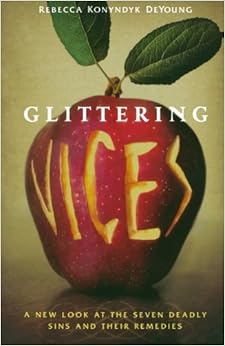Every once in a while, I come across a
book that has a little something for everyone.
In YA fiction, the Harry Potter books fit the bill. Do you like mysteries? Check! Coming of Age?
Check! Fantasy? Check! A book with a message? Check! Bad words, bosoms, and blood? Okay, maybe not *everyone.* I recently read a
book in the “Christian non-fiction” genre that
has something for almost everyone. Glittering
Vices: A New Look at the Seven Deadly Sins and Their Remedies, by Rebecca
Konyndyk DeYoung, is scholarly enough for the nerdiest reader, full of pop
culture references, and most importantly, it made me confront the sin in my own life without wanting to throw
the book across the room.
Because of its scholarly nature,
perhaps the only reader who won’t enjoy Glittering Vices is one who is looking for a quick easy read. The book is a bit nerdly because of
the nature of the topic. I didn’t realize it, but the idea of the “7
deadly sins” is not a Biblical construct at all. Christian writers and thinkers from the
fourth century on through the middle ages developed the idea of seven vices
from which flow a host of other sins.* It’s impossible for a book that quotes Aquinas
and Augustine to be a brain candy kind of book.
I’m a proud nerd, but I’ve never managed to read Augustine’s Confessions. However, I enjoyed reading small snippets from these
classic works as I read the book.
I don’t want you to get the idea, though, that Glittering Vices is dry or boring. Interspersed among the quotes from early
Christian thinkers is a plethora of pop culture references that paint a vivid
picture of what each vice looks like. For
instance, in the chapter on Envy, DeYoung uses Syndrome from The Incredibles as
an example. (Any book that has Thomas
Aquinas and a Disney movie in the same chapter – and pulls it off – is
remarkable!) Not only that, but using illustrations from fictional stories is a
much less threatening way to start a chapter than pointing out how sin might be
lurking in my own life.
This is not to say that the book didn’t
get around to self-examination. While
the author starts the chapters by defining the vices (Sloth isn’t as easy to
define as you might think) and giving a picture of what they might look like,
she continues by pointing out examples that hit closer to home. The chapter on Anger was particularly hard
for me to read, with an illustration that was all too familiar:
When children
ignore a parent’s order to come in for dinner, it may well be because they are
just happily preoccupied with their play. But a parent can read this as a
flagrant act of contemptuous disrespect… the tendency to get angry, or overly
angry, seems rooted in vulnerability and fear. Is the parent’s sense of
authority so frail that she can’t let a single act of careless disrespect slide
off?... Their angry response shows that they have lost their sense of
perspective and misjudged others’ malice out of a heightened sense of their own
vulnerability to attack.
Can I just say, “Ouch?”
Thankfully, this book is as practical
as it is painful. For each vice, DeYoung
gives steps you can take to fight against the pull of sin, based both on
Scripture and tradition. Maybe your problem is
Vainglory (‘an excessive and disordered
desire for recognition and approval from others.’ - a vice I’m convinced has been on the rise since the
advent of social media). DeYoung
suggests silence and solitude as the cure.
But she doesn’t leave it there; she gives small steps. For one day, she says, let your actions speak
for themselves without defending yourself. Or for one day, refrain from
conversations about yourself. The modern
answer for solitude might look like one day without social media. The book has many such practical solutions
for each of the vices.
What do you look for in a “Whatsoever” book?
Do you look for one that will convict you? One that will make you think? A book with fun illustrations or one that is
practical? Let me suggest Glittering Vices. It is
all of the above!
Melissa
*Don’t let the idea that the “deadly sins” are not in a Biblical list keep you from
reading the book. The Bible doesn’t make
any such ranking, but envy, for example, is definitely a sin (1 Peter 2:1,
Galatians 5:21 et al), and I learned a lot in this book simply about seven
sins, deadly or not.

Melissa,
ReplyDeleteThanks for sharing this on Bonbon 'n' Coffee Link-Up! I am going to have to get this book for sure.
Bonnir
Sounds like a great read. I'll have to check this one out for sure.
ReplyDeleteFantastic review! I'm so glad you read it and liked it. I'm reading a book now in which envy plays a huge part in the plot, and this book comes up in my mind all the time while I'm reading. It's so helpful to have a framework to think about and fight against the sins that can just take over if you let them.
ReplyDelete